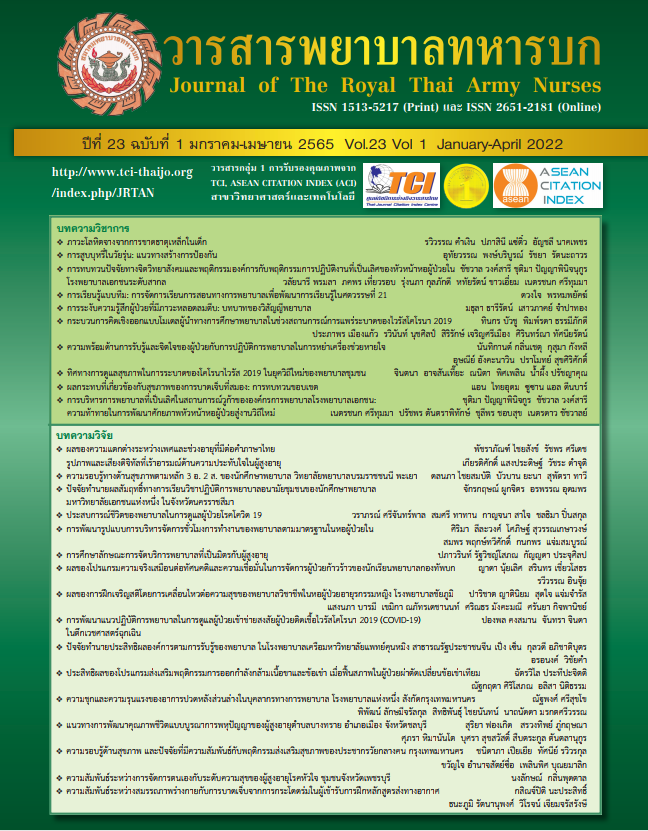A Study of Spirituality at Work of Professional Nurses
Keywords:
spirituality at work, professional nursesAbstract
This descriptive research aimed to study spirituality at work of professional nurses. The Delphi technique was used in this study. Participants were 20 experts comprising 1) administrators from the Human Resources Department 2) nursing administrators 3) administrators from the Thailand Nursing and Midwifery Council 4) academics/nursing instructors 5) nurses at practitioner level. The Delphi technique consisted of three steps. Step one: all of experts were asked to spirituality at work of professional nurses. Step two: the data were analyzed by using content analysis to develop a rating scale questionnaire. All items in the questionnaire were ranked by level of the spirituality at work of professional nurses. Step three: items were analyzed by using median and interquartile range to develop a new version of the questionnaire. The new questionnaire was sent to previous experts for confirmation. Ranked items were analyzed by using median and interquartile range again to summarize the research.
The results of this research showed that the spirituality at work of professional nurses consisted of 3 components as follows: 1) Self understanding consisted of 12 items. 2) Inner motivations consisted of 12 items 3) Positive attitude towards the work consisted of 16 items.
Downloads
References
Sorakraikitikul M, Siengthai S. Workplace spirituality:The challenge for human resource management. HCU Journal 2013; 16(32) : 129-40. (in Thai)
Wattayakorn P, Chongchareon W, and Chukumnerd P. Spiritual well-being and spirituality at work of head nurses in general hospitals. Southern Thailand. Academic Services Journal, Prince of Songkla University 2016; 27(3) : 115-26. (in Thai)
Somkumlung P, and Chaiyasit Y. Spiritual leadership concept: Its application to the nursing professional. TJNC2012; 27(4) : 16-25. (in Thai)
Preerod S. a. Relationship between workplace spirituality, organizational commitment and Organizational citizenship behavior: A case study of office of the permanent secretary, Ministry of Natural Resources and Environment. Graduated research, Rajamangala University of Technology Thanyaburi 2016 : 11-12. (in Thai)
Kazemipour F, Mohamad Amin S, Pourseidi B. Relationship between workplace spirituality and organizational citizenship behavior among nurses through mediation of affective organizational commitment. J Nurs Scholarsh 2012; 44(3) : 302–10.
Pirkola H, Rantakokko P, Suhonen M. Workplace spirituality in health care: An integrated review of the literature. Journal of Nursing Management 2014; 24(7) : 859-68.
Jaiboon P, Chiangnangarm P, Kuhirunyaratn P. The proportion and causes of resignation of nurses from Srinagarind hospital, Khon Kaen University. Srinagarind Med J 2011; 26(3) : 233-8.
Worrachitti N, Pachusilpa G. Predicting factors of professional nurses’ retentionIn private hospitals, Bangkok metropolis. Journal of The Royal Thai Army Nurses2017;18 :112-20. (in Thai)
Thara K, Wivatvanit S, and Kespichayawattana J. Nursing work values : Meanings and experiences of professional nurse. Journal of Boromarajonani College of Nursing, Bangkok 2009; 25(2) : 40-42. (in Thai)
Ashmos DP, and Duchon D. Spirituality at work: A conceptualization and measure. Journal of management inquiry 2000; 9(2) : 134-45.
Kinjerski V, Skrypnek BJ. A human ecological model of spirit at work. Journal of Management, Spirituality & Religion 2006; 3(3) : 231-41.
Downloads
Published
How to Cite
Issue
Section
License
Copyright (c) 2022 Journal of The Royal Thai Army Nurses

This work is licensed under a Creative Commons Attribution-NonCommercial-NoDerivatives 4.0 International License.
บทความหรือข้อคิดเห็นใดใดที่ปรากฏในวารสารพยาบาลทหารบกเป็นวรรณกรรมของผู้เขียน ซึ่งบรรณาธิการหรือสมาคมพยาบาลทหารบก ไม่จำเป็นต้องเห็นด้วย
บทความที่ได้รับการตีพิมพ์เป็นลิขสิทธิ์ของวารสารพยาบาลทหารบก
The ideas and opinions expressed in the Journal of The Royal Thai Army Nurses are those of the authors and not necessarily those
of the editor or Royal Thai Army Nurses Association.






